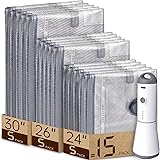There’s nothing worse than trying to catch some sleep on an airplane only to be woken up by the continual sound of snoring coming from the person next to you. I mean, you’re exhausted and all, but who would have thought that people actually snore on planes?
Although it may seem like most people never get enough sleep as it is, learning how to avoid snoring on a planes will allow you to feel more rested when you get off the plane.
In this blog, you will get to know a few of our tips for quiet travel and airplane etiquette!
Table of Contents
What are the causes of snoring
There is no human being on earth who is born with a snoring problem. It develops over time, and there are some reasons behind it. Let’s get to know about it.
Relaxation of the muscles and obstructive sleep apnea (OSA)
As we sleep, muscles relax and our airways narrow. This can cause obstructive snoring, which occurs when your tongue or the soft palate falls back into your throat.
Restless sleepers are often predisposed to snore due to obstructive sleep apnea (OSA). It occurs when those narrowed airways repeatedly collapse.
Obesity, alcohol consumption, smoking, and a deviated septum
Other conditions that may contribute to snoring include obesity, drinking alcohol before bedtime, smoking cigarettes or other drugs before bedtime, and having a deviated septum. It is the wall between your nostrils.
Upper-airway resistance due to congestion
While many people believe snoring is solely caused by reduced airflow in the respiratory tract, congestion also plays an important role in increasing upper-airway resistance during sleep. An overabundance of mucus from swollen nasal passages will inevitably result in snoring.
In fact, one of the few successful ways to ensure you won’t ever snore again is by having nose surgery.
If you’re looking for relief from these symptoms but are worried about undergoing rhinoplasty, there are tons of other options available to you. Many of the solutions don’t require major invasive surgery like adenoidectomy and turbinate reduction.
Practicing anti-snoring techniques at home to avoid snoring on a plane
To avoid snoring on a plane, it helps to practice anti-snoring techniques at home before heading out for your long flight.
Certain medical conditions can be responsible for snoring, so make sure you’re visiting your doctor if you feel like you’re making too much noise while sleeping.
Otherwise, try some of these helpful tips and get ready for your next trip.
Sleep in your own position
It sounds simple enough, but many people tie themselves down with an extra strap when sleeping on planes.
However, experts say that trying to sleep in a different position other than how you normally sleep will help eliminate or minimize snoring.
You don’t want anyone disturbed by your sound!
Be sure to try out some of these positions before your next flight, it may even mean more restful sleep for everyone on board.
Use nasal strips or ointment before boarding
Some travelers swear by nasal strips and decongestant ointments as effective remedies for flying-induced snoring.
These tricks work because they make it easier to breathe through your nose; if you’re having trouble breathing through your nostrils.
These tricks may be just what you need to keep yourself from snoring on planes.
Of course, make sure you discuss any medications with your doctor before taking them while traveling.
Drink plenty of water before takeoff
As we said above, dehydration is one of many common causes of snoring.
But fortunately, that doesn’t mean you have to avoid drinking water while flying!
In fact, experts say that sipping water throughout your flight can help prevent an itchy throat and mouth, helping you stay quiet until landing.
Keep your head up while sleeping
It sounds obvious, but experts say keeping your head up during sleep can help keep everything else quiet.
If you tend to fall asleep with your head drooping forward or onto your chest, try propping yourself up with cushions before nodding off.
This can help make breathing through your nose easier and prevent snoring from taking over your airplane experience.
Try acupuncture before flying
Many people swear by acupuncture for its ability to relieve travel-related stress and discomfort, and for helping them avoid snoring on airplanes!
You might not feel as tired after an acupuncture session, which means you’ll sleep more soundly while flying. See if it works for you!
Stay up earlier than others
Yes, we all have to stick with our flight times these days, but that doesn’t mean you have to wake up at 3 am before your trip!
If you know your snoring is triggered by being overtired, try getting in a few extra hours of shut-eye in advance of your trip.
So, leaving plenty of time between when you leave work or home can give you plenty of time for rest before takeoff.
This will also ensure you don’t exhaust yourself before you board, meaning fewer instances of snoring!
Make your own earplugs
If anti-snoring ointments aren’t working for you, consider making your own earplugs out of things like cotton balls or toilet paper rolls. This way, they won’t look odd compared to earplugs made especially for air travel.
Plus, using things around your house can cut down on expenses!
Fill a water bottle with ice and cling wrap before takeoff
Something as simple as packing ice cubes in water bottles before takeoff can help decrease swelling in your nasal passages.
This is one of many reasons why people snore while flying.
This trick also works for soothing ear pain that’s caused by pressure changes, meaning it’s a win-win for you and those around you.
To keep things sanitary, don’t forget to cover your filled bottle with plastic wrap.
After takeoff, simply remove it from its wrapper and enjoy!
Bring your own pillow
If staying hydrated doesn’t stop you from snoring, consider bringing an extra pillow of your own onto the plane. This can make sleep more comfortable and cut down on noise!
Of course, if you have sleeping problems because of pressure changes or uncomfortable seats/beds already, bring along a neck pillow instead.
We hope these tips have helped shed some light on how to avoid snoring on airplanes and how can you prepare for it from your home!
You might still suffer from frequent throat issues or bad dreams, but at least now you know what causes them!
Take an anti-snoring device with you
These are designed to keep your airways open and reduce snoring by gently squeezing and relaxing muscles in your throat.
Just remember, if it becomes uncomfortable, or is at all painful, remove it immediately. It probably won’t work as well as they promise.
Many doctors prescribe anti-snoring devices for more severe cases of snoring, but they can also help prevent light snoring from being disruptive to other passengers. It means everyone can get some sleep during those long flights!
Breathe Properly
Before boarding your flight, make sure you’re well-rested, free of sinus pain, and have eaten something.
Most snorers don’t realize they actually have sleep apnea, an involuntary but temporary cessation of breathing that usually happens when we sleep.
It isn’t dangerous, but it interrupts your sleep cycle and makes you tired throughout the day. Take these steps to increase airflow through your nasal passage and avoid snoring in public spaces like airplanes.
Sleep with a humidifier at home; humidifiers keep moisture in the air longer, which keeps mucous membranes moistened as well.
What to do to avoid snoring when you are on a Plane
In the prior section, you got to know about some preparations that need to be taken by you while you are still in your home.
Now, there is something that you should consider while being on the plane during the flight to avoid snoring and disturbing the people around you. It would be very embarrassing for you, I get that.
So, what can you do about it while being on the plane?
Choose a window seat
If you want to enjoy your flight without disturbing others, choose a window seat. The cabin walls absorb noise, which will keep sound from escaping and bothering those around you.
You’ll also have more legroom than an aisle seat, making it easier for you to stretch out after sitting for hours.
If possible, try to book a row with just one other passenger, so you can lean against your own chair for added comfort and shut out ambient sounds.
On overnight flights, ask for an empty middle seat so that you don’t wake up your neighbors when getting up to use the restroom during dark hours.
Drink water before, during, and after flight
You’ve heard it before, but it’s true. Dehydration can cause you to snore and may also be at least partially responsible for restless leg syndrome (RLS).
To reduce your risk of snoring or RLS, drink plenty of water both before and during flight.
If you are unable to drink water prior to boarding, ask if there is any available in-flight. Most airlines will serve free water during meal service. Otherwise, consider ordering an unsweetened beverage with ice.
Keep in mind that caffeinated drinks like coffee, tea, and soda all have diuretic properties that actually make you lose water and thus increase your chances of snoring or developing RLS.
Skip those pre-boarding beverages. It’s not worth the risk!
Drink lots of water throughout the entire flight, and try to get up and walk around every hour or so. Get some blood flowing through your body every once in a while.
Wear earplugs in flight
Earplugs have helped some people avoid snoring because they muffle noise and allow them to relax. They work for most people, although you can try different kinds of earplugs or even wax-based earplugs to see what works best for you.
Most travelers carry earplugs in their handbags, making it easy to put them in before dozing off.
In addition to helping reduce snoring, wearing earplugs also reduces distracting noises such as babies crying or TVs blaring.
The more peaceful sleep you get while flying on a plane, the more likely you are to arrive at your destination feeling refreshed instead of stressed out and overtired.
While it may seem impossible to sleep well in a cramped seat during an overnight flight, there are several things you can do to optimize your chances of success.
Invest in quality noise-canceling headphones
Earplugs work great for reducing snoring and dulling other sounds that might disturb your rest, but nothing will completely block out disruptive noise like premium headphones with active noise cancellation technology.
By eliminating ambient noise as you try to sleep, these headphones provide an even more peaceful environment than earplugs alone.
Pack eye masks and neck pillows
While many people prefer natural light while they read or watch movies during their flights, others want total darkness so they can nod off easily. If you fall into the latter category, opt for an eye mask to get some shut-eye without having to worry about bright overhead lights.
Keep your head propped up with pillows
One of the best ways to avoid getting headaches from uncomfortable plane rides is to make sure your head is elevated above your heart level as much as possible.
This can help prevent blood clots and promote better circulation while you sleep, which will leave you feeling more refreshed when you land at your destination. 5-6 hours before you take off.
Take advantage of airline amenities
The air pressure inside most planes is set lower than outside; however, most airlines will provide passengers with earplugs in case any snoring occurs.
Alcohol makes us sleepy, but only temporarily, it inhibits our ability to consolidate information we learned into permanent memories, so we feel tired even though we don’t really need it.
Using nasal spray
Breathe Right nasal strips and other natural remedies, such as saline spray, can open up your airways for better breathing. Using these products before you get on a plane will prevent snoring issues and help you sleep more comfortably.
To use nasal spray correctly, gently cover one nostril with your finger or thumb, then tilt your head forward over a sink so that any excess drops of medicine don’t fall on clothing. Take two short puffs from the bottle into each nostril, several times per day.
For best results, keep using at least three days after travel is completed. Who Should Use Nasal Strips? Anyone who travels regularly should take advantage of nasal strips to reduce their chances of snoring on planes.
Watch out your sleeping position
If you’re going to try to sleep while in flight, be sure to position yourself on your side. If you sleep flat on your back, you could wake up with a sore neck.
Sleeping that way also increases your chances of snoring. When you sleep, try and tuck one hand under your chin or lay it across your chest as it may help keep airways open during sleep. You could also try sleeping with your mouth slightly open.
Do not eat too much before and during flight
Airline food has gotten much better in recent years, but you should never overeat.
Many people believe that overeating will help them sleep well on an airplane, but any extra weight is going to make it harder for you to stay comfortable.
Before your flight, stick with healthy meals and snacks like nuts or granola bars. Do not drink alcohol when flying either; it could make you drowsy and cause your mouth to dry out, both of which can lead to snoring.
Practice deep breathing before sleeping
If you’re wondering how to avoid snoring on airplanes, one easy solution is breathing exercises. Deep breathing before you sleep can help encourage full lungs and better circulation, which means your body will be in better shape once it’s time for bed.
Try taking five slow, deep breaths every hour during your flight. Breathe through your nose if possible, but don’t hold your breath at any point during these exercises, just fill your belly up with air and push all of that oxygen out again slowly as you exhale.
This simple technique can greatly reduce snoring, while also helping calm thoughts and inducing a sleepier state of mind.
Sleepwear should not be tight around the neck
When you’re trying to sleep in flight, comfort is key. That means sticking with clothing that fits well and will keep you warm. But don’t sacrifice comfort for fashion, wearing tight or restricting clothing around your neck can actually encourage snoring.
It’s important to stay in loose clothing that doesn’t pinch or strangle your throat or jaw while you sleep.
Opt for something light, like silk pajamas or cotton knitwear.
In addition to keeping your body cool, these fabrics are also great at wicking moisture away from your skin, which keeps you feeling dry throughout long flights. Also try sleeping in a scarf, it’ll give you warmth and help prevent micro-depressions under your chin caused by falling asleep sitting up.
Don’t drink alcohol
Alcohol relaxes your throat muscles and may cause you to snore. Some people who drink alcohol may have loud, disruptive snores. If you’re traveling with someone who drinks, offer him or her a glass of water instead.
Wrapping things up
By now, I am sure you have got plenty of ideas about how to avoid snoring on a plane.
Being aware of proper airplane etiquette goes a long way in being courteous to those around you. It’s not just about giving up your seat for someone with better legroom or bringing an empty, airport-approved bottle through security.
It is also about acting as you would in any other public place, there is no reason to shout and there is no reason why you should ever ask someone if they’re comfortable.






